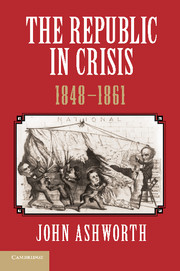Book contents
- Frontmatter
- Contents
- List of Maps and Cartoons
- Chronology of Events
- Introduction
- 1 The United States in 1848
- 2 Crisis at Mid-century, 1848–1851
- 3 Immigrants, Alcoholics and Their Enemies
- 4 Preparing for Disaster
- 5 Political Maelstrom, 1854–1856
- 6 North and South, Republican and Democrat
- 7 Political Polarisation, 1857–1860
- 8 Secession and the Outbreak of War, 1860–1861
- 9 Conclusion
- INDEX
- References
6 - North and South, Republican and Democrat
Published online by Cambridge University Press: 05 September 2012
- Frontmatter
- Contents
- List of Maps and Cartoons
- Chronology of Events
- Introduction
- 1 The United States in 1848
- 2 Crisis at Mid-century, 1848–1851
- 3 Immigrants, Alcoholics and Their Enemies
- 4 Preparing for Disaster
- 5 Political Maelstrom, 1854–1856
- 6 North and South, Republican and Democrat
- 7 Political Polarisation, 1857–1860
- 8 Secession and the Outbreak of War, 1860–1861
- 9 Conclusion
- INDEX
- References
Summary
The Pierce and the Buchanan years were dominated by first the Kansas–Nebraska Act then the subsequent developments in Kansas itself. They were not, however, the only events of these years, nor even the only attempts made at this time to strengthen slavery in the South. Pierce’s victory in 1852 immediately heralded the return of at least one highly controversial policy of the 1840s, one which had had both a partisan and a sectional dimension. In the 1840s the Democrats had sought to expand the nation’s territory; in the 1850s under first Pierce then Buchanan, the same goals were apparent.
In his inaugural Franklin Pierce declared that his administration would “not be controlled by any timid forebodings of evil from expansion”. According to the new President, “our attitude as a nation and our position on the globe render the acquisition of certain possessions not within our jurisdiction eminently important for our protection”. Within two years the policy bore fruit. James Gadsden had been sent to Mexico to negotiate the purchase of yet more territory from that hapless nation. Somewhat to Pierce’s disappointment, Gadsden managed to obtain only the small (by the standards of previous American acquisitions) area around the Gila River. Even this, however, proved more than many northern Senators were prepared to accept, given that the administration’s objective seemed to entail the expansion of slavery. The area covered by the Gadsden purchase was accordingly reduced still further.
- Type
- Chapter
- Information
- The Republic in Crisis, 1848–1861 , pp. 119 - 147Publisher: Cambridge University PressPrint publication year: 2012



